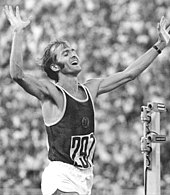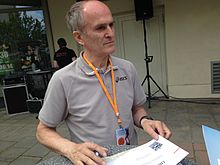Waldemar Cierpinski
|
Waldemar Cierpinski |
||||||||||||||||||||||
| nation |
|
|||||||||||||||||||||
| birthday | 3rd August 1950 (age 70) | |||||||||||||||||||||
| place of birth | Neugattersleben , GDR | |||||||||||||||||||||
| size | 170 cm | |||||||||||||||||||||
| Weight | 59 kg | |||||||||||||||||||||
| Career | ||||||||||||||||||||||
|---|---|---|---|---|---|---|---|---|---|---|---|---|---|---|---|---|---|---|---|---|---|---|
| Best performance | 2: 09: 55.0 h (marathon) | |||||||||||||||||||||
| status | resigned | |||||||||||||||||||||
| Medal table | ||||||||||||||||||||||
|
||||||||||||||||||||||
|
||||||||||||||||||||||
| last change: March 8, 2018 | ||||||||||||||||||||||

Waldemar Cierpinski (born August 3, 1950 in Neugattersleben ) is a former marathon runner and Olympic champion of the GDR .
Sports career and successes
Cierpinski was the only athlete besides Abebe Bikila to win a gold medal twice at the Olympic Games in marathon, namely in 1976 in Montreal and 1980 in Moscow . After reaching the finish line, the well-known sports reporter for GDR television Heinz Florian Oertel exclaimed with enthusiasm:
- “Dear young fathers or prospective students, have courage! Call your newcomers today Waldemar! Waldemar is here! "
His sporting successes also include the bronze medal at the 1983 World Championships in Helsinki , fourth place at the 1978 European Championships in Prague , sixth place at the 1982 European Championships in Athens and five GDR championship titles.
With his personal best of 2:09:55 h in the 1976 Olympic gold medal, he is the sixth fastest German marathon runner. (As of October 30, 2016). In 1984 he ended his active career and worked as a trainer in Halle for several years.
Waldemar Cierpinski is 1.70 m tall and weighed 59 kg at competition times.
- Placements
- 1976: Olympic champion in 2: 09: 55.0 hours
- 1978: 4th place at the European Championships in 2: 12: 20.0 hours
- 1980: Olympic champion in 2: 11: 01.0 hours
- 1982: 6th place at the European Championships in 2: 17: 50.0 hours
- 1983: 3rd place at the World Championships in 2: 10: 37.0 hours
Cierpinski's training included a mix of three-speed runs and a significant portion of an athleticism that is rare among marathon runners:
Once a week he ran 40 km and more at a rather calm pace, did repetitions over 1000 meters at the planned racing speed and interval training over 400 meters at a speed well above the racing pace.
Personal
At the beginning of 1945, Cierpinski's parents fled their hometown near Kobylin (Poland) to the west on a trek , eventually settling in Neugattersleben (Saxony-Anhalt) and farming.
Cierpinski has lived in Halle an der Saale since 1965 . He has been the owner of a sporting goods store in Halle since 1990. Since 1994 he has been running another in Quedlinburg , which is currently (as of 2014) in the Grünhagen house on the town's market, as well as a shop in Köthen . As a member of the NOK , he was involved in Leipzig's Olympic bid . He also works in the organization of the Central German Marathon between Leipzig and Halle.
In 1992, lists of unofficial employees appeared in Halle , suggesting that Cierpinski was working for the Ministry of State Security under the code name "Willi" . According to a report by the Spiegel, there is also an "obligation of silence" dated April 26, 1973, signed by Cierpinski in real names. Cierpinski denies the allegations.
As part of the workup of state coercion doping in the GDR by Werner Franke turned out that Cierpinski may have been doped. His name is mentioned in a 1974 document on the GDR's state doping plan.
Cierpinski is married to the former middle-distance runner Maritta Politz and has three sons; his son Falk Cierpinski is a marathon runner and triathlete.
Awards (selection)
- 1976: Patriotic Order of Merit in silver
- 1980: Patriotic Order of Merit in Gold
- 1984: Gold medal for the Patriotic Order of Merit
literature
- Waldemar Cierpinski & Volker Kluge : Miles and miles to a marathon. 3rd supplemented edition. Sportverlag, Berlin (East) 1989, ISBN 3-328-00365-7
- Short biography for: Cierpinski, Waldemar . In: Who was who in the GDR? 5th edition. Volume 1. Ch. Links, Berlin 2010, ISBN 978-3-86153-561-4 .
Web links
- Literature by and about Waldemar Cierpinski in the catalog of the German National Library
Individual evidence
- ↑ http://www.herbertsteffny.de/statistik/dlvewigebestenliste.htm on March 15, 2017
- ↑ Arnd Krüger : Many roads lead to Olympia. The changes in training systems for medium and long distance runners (1850–1997). In: N. Gissel (Hrsg.): Sporting performance in change . Czwalina, Hamburg 1998, pp. 41-56.
- ↑ http://www.runnersworld.de/training/waldemar-cierpinski.53202.htm on . 15th March 2017
- ^ According to information from Edgar August / Teutschenthal on August 5, 2007, who escaped from the same village with the same trek.
- ↑ a b Stasi: Confessional for informers . In: Der Spiegel . No. 45 , 1993, pp. 287 ff . ( online ).
- ↑ Cf. Thomas Purschke: "Building the socialist physical culture". The difficult handling of GDR sports journalism. In: Listen and Look . 3/2010, p. 28
- ↑ Pippig's doping affair is not an isolated incident in distance running: testosterone also makes sense in marathons. In: berliner-zeitung.de. October 14, 1998, accessed June 27, 2016 .
- ↑ http://espn.go.com/espn/page2/story?page=joyce/080822
- ↑ http://no-doping.org/wp-content/uploads/2014/05/Ines-26052014.pdf
- ↑ About the honor for the Olympic team of the GDR. Awarded high government awards. Patriotic Order of Merit in silver. In: New Germany . ZEFYS newspaper portal of the Berlin State Library , September 10, 1976, p. 4 , accessed on April 10, 2018 (free registration required).
| personal data | |
|---|---|
| SURNAME | Cierpinski, Waldemar |
| BRIEF DESCRIPTION | East German marathon runner and Olympic champion |
| DATE OF BIRTH | August 3, 1950 |
| PLACE OF BIRTH | Neugattersleben |


